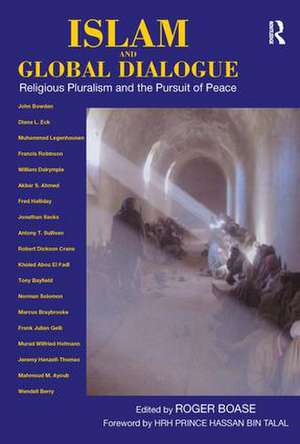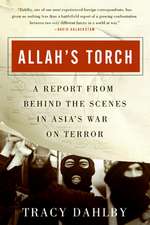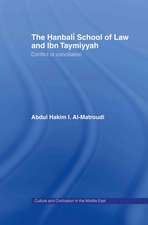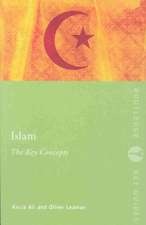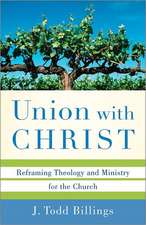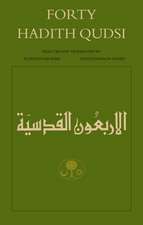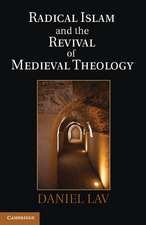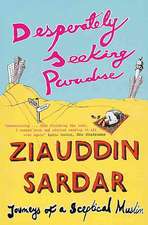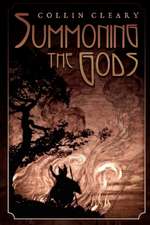Islam and Global Dialogue: Religious Pluralism and the Pursuit of Peace
Editat de Roger Boaseen Limba Engleză Paperback – 28 mai 2010
| Toate formatele și edițiile | Preț | Express |
|---|---|---|
| Paperback (1) | 330.97 lei 43-57 zile | |
| Taylor & Francis – 28 mai 2010 | 330.97 lei 43-57 zile | |
| Hardback (1) | 676.84 lei 43-57 zile | |
| Taylor & Francis – 26 oct 2005 | 676.84 lei 43-57 zile |
Preț: 330.97 lei
Nou
Puncte Express: 496
Preț estimativ în valută:
63.33€ • 66.30$ • 52.40£
63.33€ • 66.30$ • 52.40£
Carte tipărită la comandă
Livrare economică 07-21 aprilie
Preluare comenzi: 021 569.72.76
Specificații
ISBN-13: 9781409403449
ISBN-10: 1409403440
Pagini: 336
Dimensiuni: 156 x 234 x 18 mm
Greutate: 0.64 kg
Ediția:1
Editura: Taylor & Francis
Colecția Routledge
Locul publicării:Oxford, United Kingdom
ISBN-10: 1409403440
Pagini: 336
Dimensiuni: 156 x 234 x 18 mm
Greutate: 0.64 kg
Ediția:1
Editura: Taylor & Francis
Colecția Routledge
Locul publicării:Oxford, United Kingdom
Recenzii
If there were ever a time that a book on religious pluralism and peace ought to be required reading for politicians, public intellectuals, policymakers, and the media, as well as a general audience, that time is now. Conceived as a response to the excoriation of Islam after 9/11, Roger Boase has put together a remarkable book on the need for interreligous dialogue as the only way to lay the foundations for a more peaceful world. This need reverberates through each chapter, be it written by a Jewish, Christian, or Muslim scholar. This means that, as in a symphony, even though each scholar writes grounded in his/her own faith tradition (instrument), their collective voices chorus the same song. It makes for very powerful reading. Dealing with religious pluralism, a topic that touches the most important facets of life, the book has a depth to it that is profound and moving. Katherine Bullock in The American Journal of Islamic Social Sciences Today, the World's religions are challenged by factions that preach religious exclusivism and theologies of hate. As 9/11 tragically demonstrated, Islam has been hijacked and used by extremists and global terrorists. Islam and Global Dialogue is a major contribution toward the promotion of mutual understanding, religious pluralism, and tolerance and thus in the reassertion of religion's role in promoting global peace rather than conflict.' John L. Esposito, University Professor of Religion and International Affairs and Islamic Studies, Georgetown University, USA 'In a period of bloody confrontations and religious radicalisms that nourish the self-styled clash of civilisations, it is necessary to read these pluralistic reflections on the matter by a brilliant group of Jewish, Christian and Muslim intellectuals and scholars. The book is a meritorious effort to promote dialogue and peace.' Juan Goytisolo, Marrakesh 'This essential book conclusively disposes of the vicious mythology that the religious faiths are doomed to f
Notă biografică
Roger Boase is an Honorary Research Fellow at Queen Mary College, University of London, and was a Professor at the University of Fez. He has been involved in interfaith discussions for many years. His publications include The Origin and Meaning of Courtly Love (1977), The Troubadour Revival (1978), 'The Muslim Expulsion from Spain', History Today (April 2002), and, with Aisha Ahmad, Pashtun Tales from the Pakistan-Afghan Frontier (2003).
Cuprins
Introduction; Part I Defining the Issue; Chapter 1 Religious Pluralism and the Heritage of the Enlightenment, JohnBowden; Chapter 2 Is Our God Listening? Exclusivism, Inclusivism, and Pluralism, Diana L.Eck; Chapter 3 A Muslim’s Non-Reductive Religious Pluralism, MuhammadLegenhausen; Part II Islam and the West: Clash or Dialogue?; Chapter 4 Islam and the West, FrancisRobinson; Chapter 5 Of Saints and Sufis in the Near East, WilliamDalrymple; Chapter 6 Islam and the West, Akbar S.Ahmed; Chapter 7 The “Clash of Civilisations”?, FredHalliday; Chapter 8 The Dignity of Difference, JonathanSacks; Chapter 9 Conservative Ecumenism, Antony T.Sullivan; Chapter 10 From Clashing Civilisations to a Common Vision, RobertDickson Crane; Chapter 11 The Orphans of Modernity and the Clash of Civilisations, Khaled AbouEl Fadl; Part III Jewish, Christian, and Muslim Responses to Religious Diversity; Chapter 12 September 11, TonyBayfield; Chapter 13 Towards a Jewish Theology of Trilateral Dialogue, NormanSolomon; Chapter 14 Christians and People of Other Faiths, MarcusBraybrooke; Chapter 15 Mystery and Plural Faiths, Frank JulianGelli; Chapter 16 Religious Pluralism and Islam in a Polarised World, Murad WilfriedHofmann; Chapter 17 Ecumenical Islam, RogerBoase; Chapter 18 The Challenge of Pluralism and the Middle Way of Islam, JeremyHenzell-Thomas; Chapter 19 The Qur’an and Religious Pluralism, Mahmoud M.Ayoub; Part IV Postscript; Chapter 20 The Failure of War, WendellBerry;
Descriere
At a time when the world is becoming increasingly interdependent, multi-cultural and multi-religious, the concept of religious pluralism is under assault as a result of hatred, prejudice and misunderstanding from both religious exclusivists and dogmatic secularists. In this important and timely book, twenty internationally acclaimed scholars and leading religious thinkers respond to contemporary challenges in different ways. Some discuss the idea of a dialogue of civilisations; others explore the interfaith principles and ethical resources of their own spiritual traditions. All of them reject the notion that any single religion can claim a monopoly of wisdom; all are committed to the ideal of a just and peaceful society in which people of different religions and cultures can happily coexist. More space is here given to Islam than to Judaism and Christianity because, as a result of negative stereotypes, it is the most misunderstood of the major world religions. HRH Prince Hassan bin Talal of Jordan contributes the Foreword.
